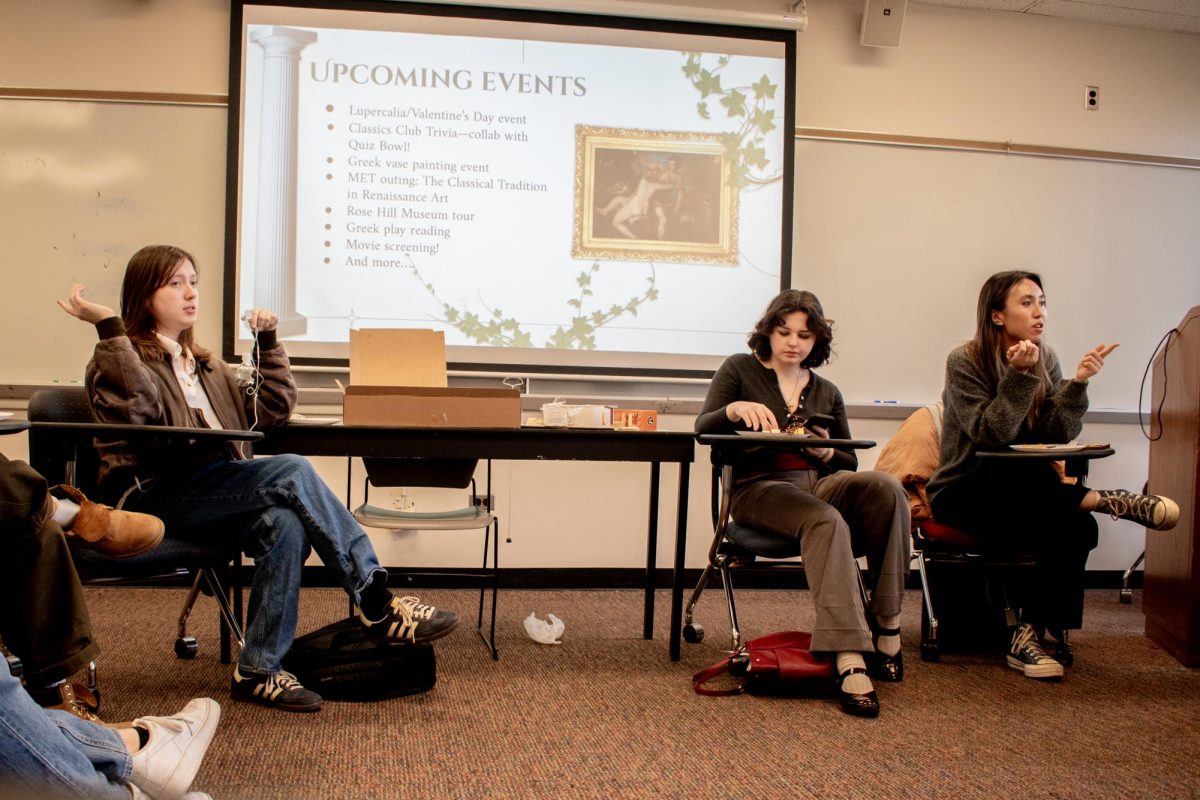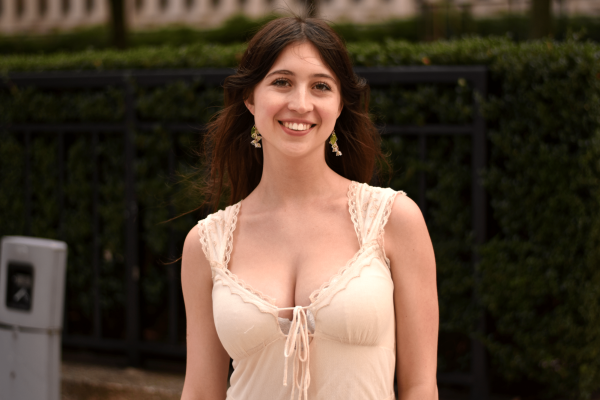Fordham’s Classics Department has experienced a decline over the years in faculty, course offerings and enrollment. This has been a blow to students, teachers and the university’s Jesuit ethos.
Classics is the interdisciplinary study of the languages, literature, history and society of Greco-Roman antiquity. Fordham offers majors in classical languages and classical civilization.
Associate Professor of Classics J. Andrew Foster has been teaching at Fordham since 2002. When he was hired, the Classics Department had seven associate professors. They are now down to three: Foster, Matthew McGowan and Sarah Pierce. With Pierce on leave since the fall 2024 semester, there are only two active classics professors. Foster will be on leave for the next full academic year.
Foster discussed the reasons behind the Classics Department’s difficulties.
“Some of our problems are highly idiosyncratic and institutionally centered, but others are just part of broader trends in higher academia,” Foster said.
Foster said that Fordham administrators have traditionally expected students to arrive with a constituted interest in classics, but this is no longer realistic. He teaches introductory classics courses in order to boost student interest.
“The only way in my view that you’re going to attract people into the world of classical antiquity, which is mysterious and wonderful and becoming increasingly mysterious, in my mind, is to introduce that world early on in your academic career,” Foster said.
Foster said he believes administrators are largely content allowing the ongoing downward spiral to run its course.
“It’s a way of engaging in constructive closure, letting us just wither away,” Foster said.
Foster said that Fordham administrators have traditionally expected students to arrive with a constituted interest in classics, but this is no longer realistic.
Jack Bailey, Fordham College at Lincoln Center (FCLC) ’28, came to Fordham with a strong passion for Latin and classical antiquity. He wanted to pursue a five-year degree and certification program in classical languages in order to become a Latin teacher. He has since switched his major to psychology after being disappointed by the lack of structure and dearth of courses.
Bailey urged the Fordham administration to be upfront about their plans for the future of the department.
“I came to this school for the classics program … I’m supposed to trust the people that I’m giving, candidly, a lot of money to,” Bailey said. “Don’t lie to me and don’t hide from me what you’re doing with my career that I had to abandon; my plan for the future which I had to abandon.”
Associate Dean Robert K. Moniot said the Classics Department’s issues have come to the attention of the deans and provost, but he does not know what their plans for the department are. Provost Dennis C. Jacobs was not available for comment by the time of publication.
Demi Lara, FCLC ’25 and president of the FCLC Classics Club, is a classical languages major with a Latin concentration. She chose Latin because the only Greek course was at 8:30 a.m. at Rose Hill, making it infeasible for her as a commuter student.
While Lara said she has not experienced much difficulty in finding courses, she acknowledged that Classics Department resources are decentralized and hard to find.
“I feel like not a lot of people know about the resources and the stuff that the Classics Department offers because people don’t really seek them out, and it’s also kind of hidden,” Lara said.
I’m trying to bring back the love of classics with Classics Club, even if people aren’t becoming classics majors, but we have good turnouts on our events.” Demi Lara, FCLC ’25
Similarly, Foster said that Fordham has pieces of classics interspersed across several departments, including philosophy, theology, English and history.
“The issue is we have our attribute all over the place, and you can cobble something together, but without any coordination, without any integration, without any program, without a mission statement and buy-in and stakeholders and everybody participates, it is exactly that: ad hoc and contingent,” Foster said.
Lara created the FCLC Classics Club during her first year to help mitigate this issue.
“I’m trying to bring back the love of classics with Classics Club, even if people aren’t becoming classics majors, but we have good turnouts on our events,” Lara said.
Foster’s solution is to create a structured, interdisciplinary program.
“The vision for classics that, and I have been openly advocating for this since 2005, is that we need to create an interdisciplinary program in what you would call Mediterranean studies or Mediterranean and near Eastern studies,” Foster said. “You could do a philosophy and religion track, a history and society track and material culture, you could do art history and literature … and then you could do a vertical major, which would have coherence, which could draw on other programs.”
Foster pitched this idea in 2016, but it was shut down by the dean of faculty at the time.
Philosophy, theology and classics are the three pillars of a Jesuit education and, despite its small program, Fordham remains the only American Jesuit university to offer a doctorate in classics.
Foster sees the root of the Classics Department’s problems as profound ideological differences around what classics is.
“But a lot of it is really ‘Why the department? What is classics? Should we continue to be a language center department?’ If you look at our enrollments, that’s where the patronage model still persists because we’re allowed to run classes that no other department with the enrollments that we have right now does,” Foster said.
Philosophy, theology and classics are the three pillars of a Jesuit education and, despite its small program, Fordham remains the only American Jesuit university to offer a doctorate in classics.
“On the other side, classics is very dear to the heart of Fordham’s tradition, and I am sure that just from the standpoint of maintaining our tradition, they would want to keep that classics department going,” Moniot said.
Despite this sentiment, Fordham’s Classics Department has experienced an undeniable decline for several reasons.
Before Fordham’s core revision in 2012, students had to take five courses to fulfill their language requirement, with the exception of classics, which only required four. The change de-incentivized students to take classical languages.
“But the new core was a drop — a big jumping off point. There were changes in upper administration. There was much greater emphasis on allocating resources based on enrollments and so forth. So we had a series of retirements in 2016, 2017 and none of those people were replaced,” Foster said.
Foster predicted that the newest iteration of the core will place greater stress on classics and other small departments because they will be less showcased in the new core’s diminished requirements.
According to Foster, teaching a full complement of Greek and Latin on both campuses would require a minimum of three professors, and this does not even account for courses in myth, literature, history, etc. This presents a resourcing issue when most classics courses remain under-enrolled.
Foster predicted that the newest iteration of the core will place greater stress on classics and other small departments because they will be less showcased in the new core’s diminished requirements.
Then there is the problem of scale. This is the first semester Foster has taught his contractual load of courses after years of teaching extra. He is contractually obligated to teach three classes one semester and two the other. Due to the small number of classics professors, Foster has taught extra courses to help students fulfill their major requirements.
Foster referenced a Dr. Seuss story to articulate the department’s plight.
“We are the Whos down in Whoville who can’t get the yop up out. Horton is never going to hear us because there’s not enough voices,” Foster said.
All this is situated within a broader national trend of classics losing their privileged niche in higher academia, rising tuition prices, the phasing out of Latin in high schools and fewer jobs in classics.
“I mean, for me, it’s a generalized skillset. I think there’s a human development component to the liberal education that you can’t really quantify, you can’t really price. But we live in a world where it’s very expensive to avoid those very hard calculations and conversations,” Foster said.
Foster also argued that administrators simply lack realism about the level of expected student engagement.
“There’s just a lot of wishful thinking about a day that probably never really existed, but certainly has gone by,” Foster said.
Fordham’s Department of Classics lacks internal governance. In 2018, Professor McGowan stepped down as chair of the Classics Department. Since then, the department has had a new, external interim chair each year, culminating with Professor Johanna L. Francis, an economics professor and current acting chair.
For the past five years, the Classics Department has been holding departmental meetings and nominating a potential internal chair, but the provost has declined to appoint that person.
“And I would imagine that that message, that there’s a message of ‘We’re not quite confident that you can govern yourselves,’ is, I think, not an unfair inference to draw from that decision,” Foster said.
Foster likened the situation to standing on a landmine. Professors across arts and sciences are terrified to make a change for fear that it will blow up, and they will not be able to put the pieces back together, according to Foster. The danger in a landmine isn’t stepping on but stepping off. You can’t stand there forever, though.




Ramses • Feb 24, 2025 at 1:18 pm
Thank you for shining a light on this issue. Fordham University’s Classics Department was a hidden gem. Unfortunately, the University seems to have refused to support the department sufficiently. In 2005 there were five full-time professors. Unless the University changes direction, in Fall 2025, there will be only one full-time professor teaching. If Fordham believes in its history and traditions, it must fund the study of Classics, which is the foundation of the liberal arts.
I wonder why only one professor was quoted here? Were Profs. Pierce and McGowan unavailable? I’m sorry for Demi Lara, who should be able to study Greek at Fordham without the expectation that should would commute from LC to RH by 8:30am. If there were more professors in the department, this likely wouldn’t be an issue.
Daniel • Feb 9, 2025 at 10:42 pm
People also seem to be turning away from classics because of its association with the hard right/white supremacy. Also just the fact that a primary justification for classics’ inclusion in core curricula has been Ancient Greece and Rome’s provision of the liberal democratic framework within with our republic operates, a framework which has come under heightened scrutiny. Progressive practitioners (e.g., Dan-El Padilla Peralta at Princeton) do what they can to reorient the discipline, but then there’s pushback from the traditionalists. And then everything mentioned in the article on top. Pretty messy.